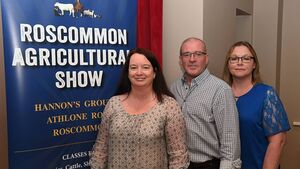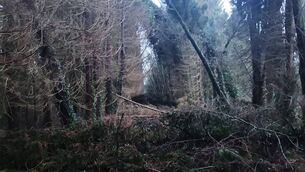Fallon's Town Talk: The rituals of August signal the vibrancy of communities

Tracey Hanlon-Owens, Roscommon Agricultural Show treasurer; Damien Hannon, chairperson and Pamela Gately, secretary. Pic: Ger Loughlin
The rituals of late summer are upon us. August is an in-between month, not quite summer but not fully autumn either. The first two weeks of August are holiday time for many people and are often the hottest time of the year, although there isn’t any sign that the 31.1 degrees recorded in Mount Dillon weather station in mid-July is going to be surpassed.
August is the signal for a last fling of summer but also the vibrancy of communities. The Galway Races and Ballygar Carnival are over. This week the hard-working members of the Roscommon Show Committee have been busy preparing the field beside Hannon’s Hotel for their showpiece event next Saturday.
Many parishes in Roscommon hold their cemetery Masses around this time of year. They are an important tradition and, when the weather plays ball, an occasion for people to meet, chat and share reminiscences about the people who have passed on and the times they lived in.
The Fleadh Cheoil is an astounding modern success story and a reminder of the vibrancy of Irish traditional music in the 21st century, It’s estimated that over 500,000 people attended the Fleadh in Wexford last week. The impact on the local economy of the town which hosts the Fleadh is astounding.
A further musical extravaganza takes place when Oasis come to Dublin next weekend. The revival in interest in the music of Oasis has been one of the stories of the year and excitement is reaching fever pitch ahead of the concerts. Why would the GAA consider playing the All-Ireland finals to August when this financial juggernaut is hitting Croke Park?
Those of us who were around when Oasis first burst on the music scene in the mid-1990s have been fascinated to watch Gen Z (that is teenagers and 20-somethings to you and me) latch on to the music of the Gallagher brothers. Oasis have been nearly as much part of the musical and cultural fabric of 2025 as of 1995.
As I write these words, another totem pole of late summer in Ireland is unfolding on the television. The Dublin Horse Show holds a special place in the affections of those who grew up in the 1970s and 1980s.
It was a different Ireland but it was also a television and sporting world that is unrecognisable today. Last weekend, Clubber provided GAA fans with an avalanche of live club matches from all around the country.
Try to explain to young people (the aforementioned Gen Z) that 40 years ago, only five GAA matches (the All-Ireland semi-finals and finals) were broadcast live – in the whole year. Sometimes the interprovincial Railway Cup finals were shown as a St. Patrick’s Day treat, but even in the 1970s interest was waning in those matches.
In such a world, the Dublin Horse Show was a glamourous delight – the equine version of Wimbledon – which meant RTÉ television began broadcasting at lunchtime rather than late afternoon or teatime.
This year live coverage didn’t begin until Friday, which was Aga Khan Cup day. That event was always the highlight – an international competition Ireland could, and did, win; something that was a rarity in the 1970s.
Back in the day, RTÉ’s coverage lasted all week. Showjumpers came from around Europe and even the United States or Brazil to compete; they also had exotic names like Nelson Pessoa and Paul Schockemohle. Long before Roscommon Town had a thriving Brazilian community, Pessoa was the only Brazilian person we saw between soccer World Cups.
Two of the superstars were British, the unflappable David Broome and the outlandish Harvey Smith whose fame or, rather, notoriety transcended the sport. Harvey was box office and so was our Irish knight in shining armour, Longford’s Eddie Macken, who has family links with Roscommon Town, and his trusty steed, Boomerang.
It wasn’t just the Nations Cup that transfixed television audiences. The other major event was the Puissance, a fancy word for a competition that had a high wall fence that was the test for these great riders and horses. The drama would be ratcheted up as extra height was added and a cacophony of noise would burst from the fans in the RDS arena if the wall was cleared.
Next week, the Premier League will begin, and that behemoth will sweep all other televised sports aside. I doubt if anyone would turn the clock back to a time of hardly any live sport on television, but it was fun, at least for a few hours last Friday, to be reminded of a more innocent sporting era.





